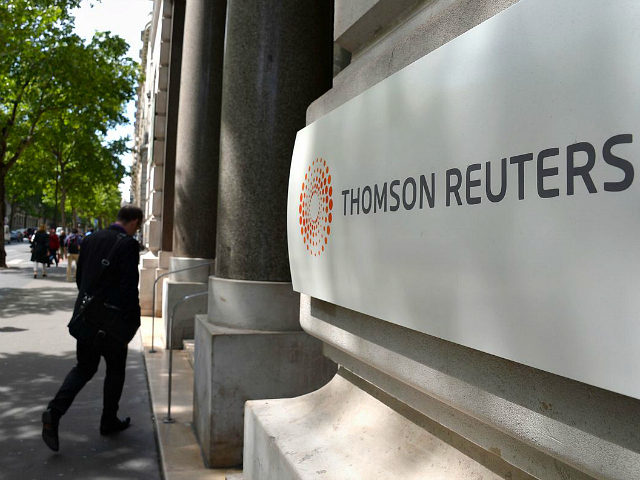China’s Global Times government propaganda newspaper accused the international news agency Reuters of racism for using a photo of People’s Liberation Army (PLA) soldiers in a story on military infiltration of foreign academia.
The racism accusation stemmed from Reuters posts on Twitter featuring photos of the soldiers. The text of the posts focused on experiments on monkey brains at the University of Copenhagen by a Chinese scientist that, according to Reuters, directly benefitted the PLA. Scientist Guojie Zhang reportedly exposed monkeys to high altitudes for studies on how mountainous areas affect brain function – research that would directly benefit PLA operations in the Himalayas – without notifying the University of Copenhagen that he was cooperating with a foreign military.
The Global Times used the fact that Zhang experimented on monkeys to claim that Reuters was comparing PLA soldiers to monkeys. Pressure from Chinese “netizens” – government-approved and, often, controlled social media users – appears to have resulted in Reuters retracting the tweet in question and accepting that it “could have been read as offensive.”
The Chinese state newspaper declared itself unsatisfied with Reuters’ response to the alleged scandal.
“Reuters has downplayed its mistake of attaching a picture of Chinese soldiers to a racist Twitter post, by simply correcting the picture and deleting the original tweet,” the Global Times asserted on Friday. “It has yet to explain why it did so in the first place or apologize for its racism.”
The Global Times asserted that the image of Chinese soldiers “had nothing to do with the content of the tweet,” which read in part, “a Chinese professor at a top European university worked with a Chinese military laboratory on research.” A Reuters post with the photo, but omitting the reference to monkeys, is still available on Twitter at press time.
Reuters replaced the post mentioning monkeys and issued a “photo correction.”
“Some criticized Reuters for having no journalistic integrity at all and there must be something wrong with their editors’ minds,” the Global Times claimed, citing “netizens” on Chinese-controlled websites and communist sympathizers on Twitter. “One netizen wrote that the COVID-19 pandemic has shattered many ‘myths’ in the West including that about so-called press freedom.”
Among other “netizens” cited were an account on Weibo, the Chinese government-controlled social media outlet, stating that Reuters had “serious racist tendencies” and an alleged tweet reading, “This is the double-label racist media in Europe and America!”
The Reuters story exposed secret military ties between a professor conducting research at the University of Copenhagen and the PLA.
“Zhang [Guojie] and a student he was supervising worked with a People’s Liberation Army (PLA) laboratory on research exposing monkeys to extreme altitude to study their brains and develop new drugs to prevent brain damage,” Reuters reported, “a priority the PLA has identified for Chinese troops operating on high plateau borders.”
The head of the University of Copenhagen’s biology department told Reuters that it did not know that Zhang was cooperating with the military on research conducted at the institution and only found out after Zhang published a paper on his findings. The paper featured a PLA major general as a coauthor.
“Zhang confirmed that he did not inform the university of the link because the university didn’t require researchers to report co-authors on scientific papers to it,” Reuters noted.
Zhang is an employee of BGI Genomics, a firm Reuters revealed in July was sharing the results of genetic testing on unborn children around the world with the PLA. BGI insisted to Reuters the monkey altitude study was “not carried out for military purposes.”
China has very overt military reasons to carry out research on the effects of high altitudes on brain performance. Under dictator Xi Jinping, China has accelerated its colonization campaigns in Tibet, trespassing into Indian territory beyond the occupied Tibetan region. PLA efforts to violate India’s sovereignty ended in catastrophe for Beijing last year. In June 2020, PLA soldiers triggered a clash with the Indian military in the Galwan Valley, territory on their mutual border. While the Communist Party refused to offer the public accurate casualty counts, Indian reports claimed that China lost double the number of soldiers than the Indians despite greatly outnumbering Indian forces. As neither side permitted the use of firearms, the Galwan Valley battle was fought with fists and rudimentary weapons like rocks. Reports suggested that most deaths resulted from hypothermia, poor breathing, falling off of steep cliffs, or other environmental factors in addition to the fighting.
China has openly boasted of investments in military technology to improve performance at high altitudes since the Galwan Valley incident. In December, the Global Times announced that the PLA had equipped soldiers on the Indian border with an “exoskeleton suit” to help them move more quickly and warmly in Tibet. The suit also allegedly helps soldiers carrier heavier loads around the steep cliffs over long distances.
More recently, in September, the PLA published videos of military exercises by its Tibet unit, showing them clearly practicing defensive measures in mountainous areas.
Follow Frances Martel on Facebook and Twitter.

COMMENTS
Please let us know if you're having issues with commenting.